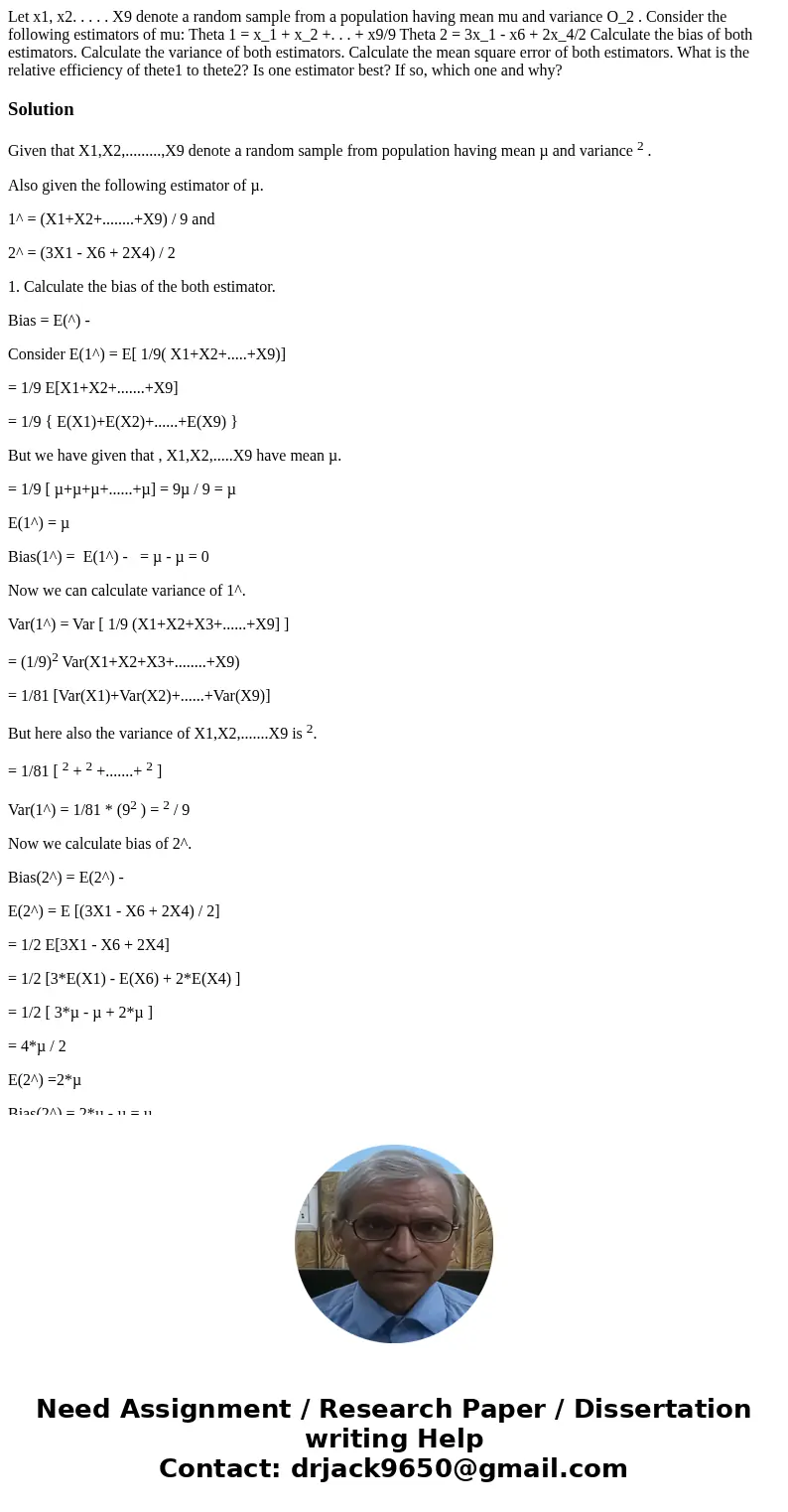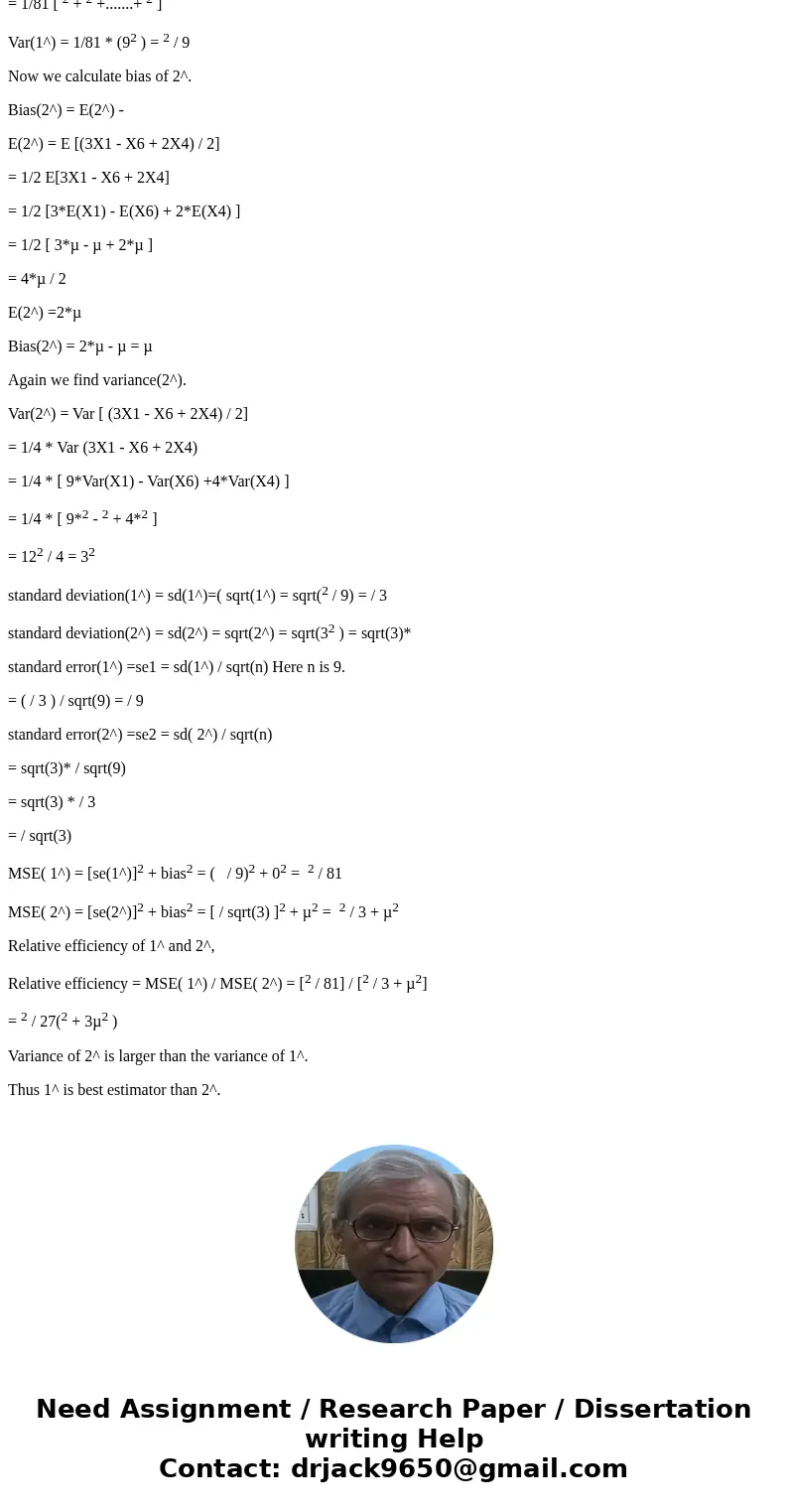Let x1 x2 X9 denote a random sample from a population ha
Solution
Given that X1,X2,.........,X9 denote a random sample from population having mean µ and variance 2 .
Also given the following estimator of µ.
1^ = (X1+X2+........+X9) / 9 and
2^ = (3X1 - X6 + 2X4) / 2
1. Calculate the bias of the both estimator.
Bias = E(^) -
Consider E(1^) = E[ 1/9( X1+X2+.....+X9)]
= 1/9 E[X1+X2+.......+X9]
= 1/9 { E(X1)+E(X2)+......+E(X9) }
But we have given that , X1,X2,.....X9 have mean µ.
= 1/9 [ µ+µ+µ+......+µ] = 9µ / 9 = µ
E(1^) = µ
Bias(1^) = E(1^) - = µ - µ = 0
Now we can calculate variance of 1^.
Var(1^) = Var [ 1/9 (X1+X2+X3+......+X9] ]
= (1/9)2 Var(X1+X2+X3+........+X9)
= 1/81 [Var(X1)+Var(X2)+......+Var(X9)]
But here also the variance of X1,X2,.......X9 is 2.
= 1/81 [ 2 + 2 +.......+ 2 ]
Var(1^) = 1/81 * (92 ) = 2 / 9
Now we calculate bias of 2^.
Bias(2^) = E(2^) -
E(2^) = E [(3X1 - X6 + 2X4) / 2]
= 1/2 E[3X1 - X6 + 2X4]
= 1/2 [3*E(X1) - E(X6) + 2*E(X4) ]
= 1/2 [ 3*µ - µ + 2*µ ]
= 4*µ / 2
E(2^) =2*µ
Bias(2^) = 2*µ - µ = µ
Again we find variance(2^).
Var(2^) = Var [ (3X1 - X6 + 2X4) / 2]
= 1/4 * Var (3X1 - X6 + 2X4)
= 1/4 * [ 9*Var(X1) - Var(X6) +4*Var(X4) ]
= 1/4 * [ 9*2 - 2 + 4*2 ]
= 122 / 4 = 32
standard deviation(1^) = sd(1^)=( sqrt(1^) = sqrt(2 / 9) = / 3
standard deviation(2^) = sd(2^) = sqrt(2^) = sqrt(32 ) = sqrt(3)*
standard error(1^) =se1 = sd(1^) / sqrt(n) Here n is 9.
= ( / 3 ) / sqrt(9) = / 9
standard error(2^) =se2 = sd( 2^) / sqrt(n)
= sqrt(3)* / sqrt(9)
= sqrt(3) * / 3
= / sqrt(3)
MSE( 1^) = [se(1^)]2 + bias2 = ( / 9)2 + 02 = 2 / 81
MSE( 2^) = [se(2^)]2 + bias2 = [ / sqrt(3) ]2 + µ2 = 2 / 3 + µ2
Relative efficiency of 1^ and 2^,
Relative efficiency = MSE( 1^) / MSE( 2^) = [2 / 81] / [2 / 3 + µ2]
= 2 / 27(2 + 3µ2 )
Variance of 2^ is larger than the variance of 1^.
Thus 1^ is best estimator than 2^.


 Homework Sourse
Homework Sourse